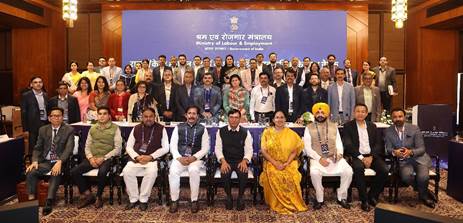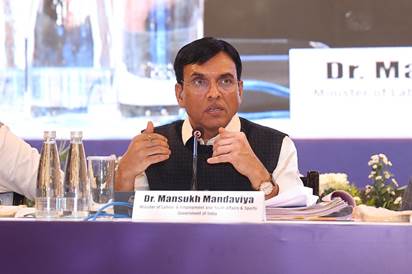New Delhi: The two-day workshop with Labour Ministers and Labour Secretaries of States and UTs concluded today under the chairmanship of Dr. Mansukh Mandaviya, Union Minister for Labour & Employment and Youth Affairs & Sports. Minister of State for Labour and Employment, Shobha Karandlaje, along with Labour Ministers from various States/UTs, Ms. Sumita Dawra, Secretary of the Ministry of Labour & Employment, and senior officials from States/UTs, attended the workshop. These sessions marked the successful conclusion of six regional workshops and several other consultations held over the past year with all 36 States and UTs. Over ten topics were discussed during the five sessions spread across two days, and inputs were gathered with the aim of designing targeted action items. Three committees, each consisting of five states, were formed. These committees will continue consultations and develop a sustainable model for comprehensive social security coverage for workers, which will be presented in March 2025.
During his address, the Union Minister laid out a comprehensive action plan for all stakeholders, urging States to assess the feasibility of adopting best practices showcased by different States/UTs during the workshop. He emphasised that the Ministry remains committed to working closely with State Governments to design reforms and initiatives ensuring the welfare of both organised and unorganised workers. Holistic and sustainable welfare programmes, such as pensions, healthcare, life and accident insurance, etc., are currently under discussion.
Social security for unorganised sector workers, including those in building and construction work, the gig and platform economy, and other sectors, was a key topic of discussion. The Union Minister emphasised the need to develop sustainable social security models for these workers. Other key agenda items included the welfare of contract labour and the transformation of the role of the inspector into an inspector-cum-facilitator.

States highlighted their progress in utilising BOCW cess funds for social security coverage, as well as the development of education and skill institutions for the children of building and construction workers. Innovative ways of utilising these resources for various social welfare initiatives, such as pensions, were widely discussed.
The progress made in onboarding unorganised workers onto the eShram portal was showcased, demonstrating the Government’s efforts to strengthen the last-mile delivery of benefits to these workers. Over 30 crore unorganised workers are now registered on the eShram portal. The Ministry is also working on designing a dedicated Social Security and Welfare Scheme for gig and platform workers. The modalities of funding, data collection, and administration of the scheme were discussed, with States urged to prioritise the sharing of data on unorganised workers, particularly gig and platform workers, and support their registration on eShram on a mission mode. Integration of eShram with Government portals like NCS and SIDH is also contributing to employment generation, employability, skill development, and more.
The shift from the inspector to the inspector-cum-facilitator model was another major reform discussed with State/UT administrators. The aim of this reform is to reduce the compliance burden, promote ease of doing business, and ensure decent working conditions, equal opportunities at work, and improved employee-employer relationships.
In her closing remarks, Shobha Karandlaje, Minister of State for Labour and Employment, emphasised the important contribution of India’s workforce in achieving the goal of becoming a developed nation (Viksit Bharat) by 2047. Maximising social security coverage and ensuring labour welfare for both organised and unorganised workers was the main goal of the consultations held over the past year and during this two-day workshop. She reiterated the need for a whole-of-government approach to bring all initiatives to a successful conclusion within a time-bound framework.
The two-day meetings, conducted in the spirit of cooperative federalism, demonstrated the Government’s commitment to promoting labour welfare, facilitating ease of doing business, and supporting industrial growth across States and UTs.


